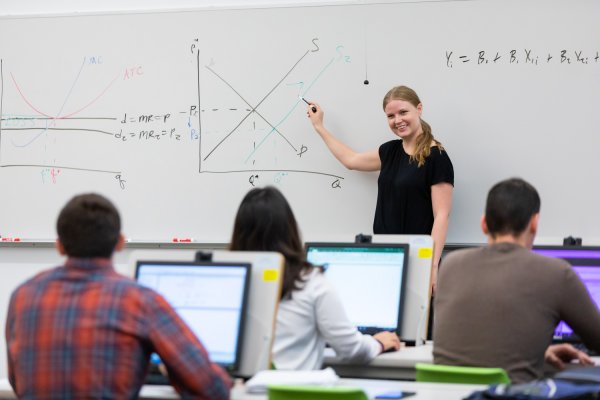Courses
| Courses | Credits |
| ECON 136: The Economics of Health, Education, and Welfare
This course is an introduction to the economics of public and private provision of health, education, and social services in urban and developing economies. May be used to fulfill the cultural diversity course component of the general-education requirements. ECON 136 will not count towards fulfilling the minimum major or minor requirements. |
3 |
| ECON 210: Environmental Economics and Policy
An introductory study of the relationship between environmental quality and economic behavior, with an emphasis on the principles of demand, costs, and economic efficiency. Current developments in the United States and world environmental policies will be analyzed. May be used in partial fulfillment of the social analysis component of the general-education requirements. |
3 |
| ECON 221: Principles of Microeconomics
An introductory study of the central functions and problems of an economic system with emphasis on the determinants of consumer demand, producer supply, and their interactions in the marketplace. |
3 |
| ECON 222: Principles of Macroeconomics
An introduction to macroeconomic analysis with emphasis on national income, consumer spending, investment, government, and monetary aspects. |
3 |
| ECON 233: The Economics of Race and Gender
Investigates the employment gaps and earnings gaps that exist between women and men and between various racial and ethnic groups in America. Economic analysis of discrimination and its consequences for individuals and families. May be used to fulfill the cultural diversity course component of the general-education requirements. |
3 |
| ECON 236: Contending Economic Theories
A comparative analysis of political theories and the economic systems that derive from those theories. The course focuses on those ideological assumptions that result in capitalism, socialism, anarchism, etc. as the solution to economic problems. Prerequisite: ECON 221 or 222. |
3 |
| ECON 290: Topics in Economics
A course in which a special topic in economics is given intensive study. Topics descriptions and prerequisites will be announced in advance. May be repeated for credit if topics are different. Prerequisites vary depending on the topic chosen. |
3 |
| ECON 321: Intermediate Microeconomic Theory
A study of the theoretical concepts and analytical techniques which economists employ to interpret the process of resource allocation under various systems of economic organization. Prerequisite: ECON 221 and MATH 131. |
3 |
| ECON 322: Intermediate Macroeconomic Theory
A critical examination of theories of national income determination and of techniques for measuring and analyzing aggregate economic activity. Prerequisite: ECON 222 and MATH 131. |
3 |
| ECON 325/525: Econometrics
The application of mathematical and statistical techniques to the analysis of economic issues. Development of simple and multiple regression as tools of analysis. Use of computer facilities and statistical programs to apply the tools to current economic data. Prerequisites: ECON 221, 222, MATH 131 and one of the following: STAT 140, STAT 240, PSY 201 or IDS 205. |
3 |
| ECON 326: International Economics
A study of the basis for the gains from international trade, including the effects of growth and development on a nation’s welfare. Attention is also given to the effects of tariffs and other restrictions to trade. Balance of payments accounting, foreign exchange markets, and international monetary institutions are covered during the last part of the course. Prerequisites: ECON 221 and ECON 222. |
3 |
| ECON 336/536: Economics of Developing Nations
An analysis of economic variables, both theoretical and institutional, which characterize developing nations. Emphasis is placed on cyclical poverty, allocation of resources, and policy planning. Prerequisite: ECON 221 or 222, and junior standing. May be used to fulfill the cultural diversity or the social science course component of the general-education requirements. |
3 |
| ECON 337/537: Public Finance
An analysis of the role of the government sector in a market economy. Causes of market failure, the efficient provision of public goods, and the effects of taxation are considered as they relate to economic activity. Prerequisite: ECON 221 or 222. |
3 |
| ECON 338/538: Economics of Financial Markets
A focus on financial markets and their relationship to the economy. Topics include modern portfolio theory, the capital asset pricing model, arbitrage pricing theory, and the efficient market hypothesis. The valuations of fixed Prerequisites: ECON 221, ECON 222, and junior standing. |
3 |
| ECON 339/539: Money and Banking
A study of the institutions, principles, and problems of money and banking in the United States. Special attention is given to the basic elements of monetary theory and policies. Prerequisite: ECON 222. |
3 |
| ECON 370: The History of Economic Thought
Economic thought in its historical development from the Mercantilists to the present day. Prerequisite: ECON 221 or 222. |
3 |
| ECON 390/590: Topics in Economics
A course in which a special topic in economics is given intensive study. Topics, descriptions, and prerequisites will be announced in advance. May be repeated for credit if topics are different. Prerequisites: ECON 221 and 222. |
3 |
| ECON 473/573: Applied Data Science
A focus on data management, business analytics, predictive analytics, and econometric modeling. Logistic regression, instrumental variables estimation, and other estimation techniques are discussed. Prerequisite: ECON 325 or STAT 340, ECON 221, and ECON 222. |
3 |
| ECON 486: Internship in Economics
Direct, supervised experience in a cooperating business, government agency, or service agency requiring the use of a student’s economics knowledge. Some internships are in conjunction with off-campus programs such as the Washington Semester Program. Prerequisite: consent of the chair of the department. ECON 486 will not count towards fulfilling the minimum major or minor requirements. |
(1-3 credits) |
| ECON 495: Independent Study in Economics
Independent study to be approved by the chair and the economics advisor. |
(1-3 credits) |
| ECON 497: Honors Work in Economics
See Honors Work in the General Catalog |
|
| ECON 498: Honors Candidacy in Economics
See Honors Work in the General Catalog |
